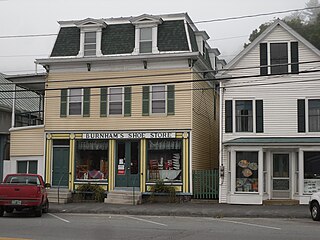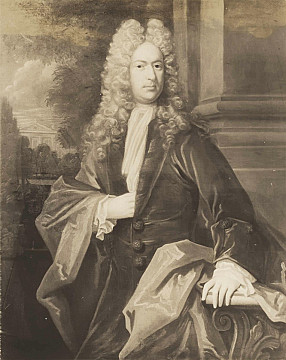Related Research Articles

The Abenaki are Indigenous people of the Northeastern Woodlands of Canada and the United States. They are an Algonquian-speaking people and part of the Wabanaki Confederacy. The Eastern Abenaki language was predominantly spoken in Maine, while the Western Abenaki language was spoken in Quebec, Vermont, and New Hampshire.

Caledonia County is a county located in the northeastern part of the U.S. state of Vermont. As of the 2020 census, the population was 30,233. Its shire town is the town of St. Johnsbury. The county was created in 1792 and organized in 1796. It was given the Latin name for Scotland, in honor of the many settlers who claimed ancestry there.

Danville is a town in Caledonia County, Vermont, United States. The population was 2,335 at the 2020 census. The primary settlement in town is recorded as the Danville census-designated place (CDP) and had a population of 385 at the 2020 census.

Wells River is a village in the town of Newbury in Orange County, Vermont, United States. The population was 431 at the 2020 census. The village center is located at the junction of U.S. Routes 5 and 302.

Newbury is a town in Orange County, Vermont, United States. The population was 2,293 at the 2020 census. Newbury includes the villages of Newbury, Center Newbury, West Newbury, South Newbury, Boltonville, Peach Four Corners, and Wells River.
The Northeast Kingdom is the northeast corner of the U.S. state of Vermont, approximately comprising Essex, Orleans, and Caledonia counties and with a population of 64,764 at the 2010 census. The term "Northeast Kingdom" is attributed to George D. Aiken, former Governor of Vermont and a U.S. senator, who first used the term in a 1949 speech.

Cabot is a six-mile-square New England town located in the northeast corner of Washington County, Vermont, United States. The population was 1,443 at the 2020 census. It contains the unincorporated villages of Cabot Village, Cabot Plain, South Cabot (Hookerville), East Cabot, Lower Cabot, and West Hill. There was also a community known as Petersville until property owners there sold a total of 100 acres to Molly’s Falls Electric Light and Power Company, and in 1925 a large dam was constructed on Molly’s Brook, that completely flooded the area that had been farms and homes to create what is now known as Molly’s Falls Reservoir, or sometimes “Marshfield Dam,” which is located close to the Cabot/Marshfield town line.

Dummer's War (1722–1725) was a series of battles between the New England Colonies and the Wabanaki Confederacy, who were allied with New France. The eastern theater of the war was located primarily along the border between New England and Acadia in Maine, as well as in Nova Scotia; the western theater was located in northern Massachusetts and Vermont in the frontier areas between Canada and New England.

William Dummer was an American-born politician and colonial administrator who spent the majority of his life in the Province of Massachusetts Bay. Dummer served as the colony's lieutenant governor from 1716 to 1730, including an extended period from 1723 to 1728 when he acted as governor. He is remembered for his role in leading the colony during Dummer's War, which was fought between the British New England Colonies and a loose coalition of Indian tribes in modern-day New Hampshire, Maine, New Brunswick, and Nova Scotia.

Vermont Route 15 (VT 15) is a 68.957-mile-long (110.976 km) east–west state highway in northern Vermont, United States. Its western terminus is at U.S. Route 2 (US 2) and US 7 in Winooski and its eastern terminus is at US 2 in Danville. It is known as the Grand Army of the Republic Highway, a designation shared nationally with U.S. Route 6.
The Bayley–Hazen Military Road was a military road that was originally planned to run from Newbury, Vermont, to St. John's, Quebec, not far from Montreal. The southern 54 miles (87 km), running from Newbury to Hazen's Notch near the Canada–United States border, were constructed between 1776 and 1779 during the American Revolutionary War. Portions of the road's route are used by modern roads today.

The Passumpsic River is a 22.7-mile-long (36.5 km) tributary of the Connecticut River, in Vermont. Though primarily a Caledonia County river, it is the only river to flow through all three counties of the Northeast Kingdom.

The Missiquoi were a historic band of Abenaki Indigenous peoples from present-day southern Quebec and formerly northern Vermont. This Algonquian-speaking group lived along the eastern shore of Lake Champlain at the time of the European incursion. Today, they are part of the Conseil des Abénakis d'Odanak, a First Nation in Quebec.
Coos, New Hampshire refers to the frontier area of northern New Hampshire. During the American Revolution a military command was located at Haverhill, New Hampshire to protect the New Hampshire Grants and to support military efforts in the invasion of Canada.

The Battle of Pequawket occurred on May 9, 1725 (O.S.), during Father Rale's War in northern New England. Captain John Lovewell led a privately organized company of scalp hunters, organized into a makeshift ranger company, and Chief Paugus led the Abenaki at Pequawket, the site of present-day Fryeburg, Maine. The battle was related to the expansion of New England settlements along the Kennebec River.
State v. Elliott, 616 A.2d 210, is a decision of the Vermont Supreme Court holding that all aboriginal title in Vermont was extinguished "by the increasing weight of history." The Vermont Supreme Court has clarified that its holding in Elliott applies to the entire state.
The Nulhegan Band of the Coosuk Abenaki Nation is a state-recognized tribe and nonprofit organization, called AHA "Abenaki Helping Abenaki", whose headquarters and land are based in Vermont. They are often referred to as the Nulhegan Abenaki Tribe or simply, Nulhegan.

The Battle of Norridgewock was a raid on the Abenaki settlement of Norridgewock by a group of colonial militiamen from the New England Colonies. Occurring in contested lands on the edge of the American frontier, the raid resulted in a massacre of the Abenaki inhabitants of Norridgewock by the militiamen.
Jacob Bayley was an officer, first serving with the British in the French and Indian War, then later as a brigadier general in the Continental Army during the American Revolutionary War.
Jacob Kent Jr. was a farmer, hotel operator, and government official in Vermont. A Democrat, he was most notable for his service as Sheriff of Orange County, Vermont (1842-1844) and United States Marshal for the District of Vermont.
References
- 1 2 3 4 5 6 Johnson, Arthur (Nov 2007). "Indian Joe". Ne-Do-Ba (Friends). Retrieved 31 January 2015.
- 1 2 3 Brown, E. Jane (September 1994). "Welcome to Joe's Pond Vermont". Originally published in The Caledonian Record. Archived from the original on 9 May 2008. Retrieved 17 January 2017.
- ↑ Dodge, Sylvia C. (2021-07-29). "Remembering Joseph Susap – 'Indian Joe'". The North Star Monthly. Retrieved 2024-05-09.